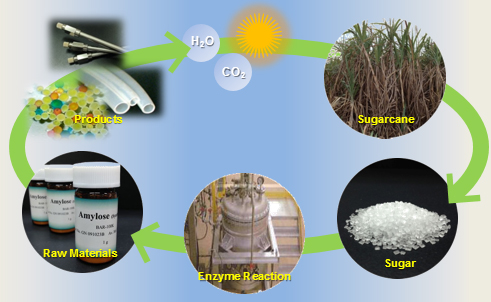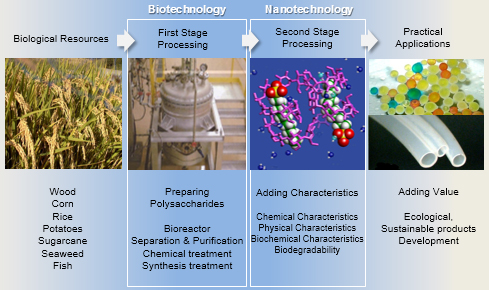Carbohydrates are the most common organic compounds on earth. In addition to their importance as raw materials, recent research has explored their use in the development of safe regenerative and advanced materials including functional foods.
Using carbon-neutral biotechnology and nanotechnology, PS-Biotec designs and
provides next-generation polysaccharides.
Carbon Neutral Society Initiative
When plant-derived fuels are burned, they release into the atmosphere CO2 that had previously been captured by the plants via photosynthesis, so the CO2 concentration in the atmosphere is held constant. In other words, the process is carbon neutral. The cycle for sugar is shown below.

Carbohydrates and Polysaccharides
Polysaccharides are made of chains of monomeric sugars. Plants, being organisms that use photosynthesis, produce carbohydrate that is the main source of energy for animals and microbes in nature.
Carbohydrate is an essential raw material for people as well.
In recent years, carbohydrate has attracted attention as an ecological, renewable resource that is essential for life, maintaining health and protecting against lifestyle diseases. For example, much of the dietary fiber you hear about, as well as the moisturizer hyaluronic acid, is in fact carbohydrate.
It is also the raw material to make bioplastics (biodegradable plastics not made from fossil fuels).
Product Development

Main Products
Product Name |
Characteristics |
| Synthetic Amylose | Unlike natural amylose, has a narrow molecular weight distribution and an unbranched linear structure. |
| Water-soluble Xylan | A water-soluble dispersant that solubilizes and disperses carbon nanotubes (CNTs) in water. |
| Resistant Starch Rice wx/ae WE-Mai |
High in lipids and resistant starch, a kind of dietary fiber. Better than ordinary rice for avoiding lifestyle diseases. |




